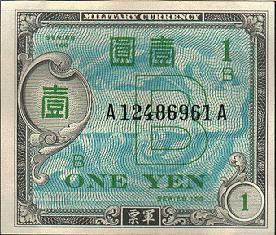
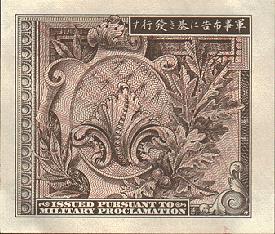
For details, click here. |
In March 1945,1 again found myself in Port Hueneme, assigned as Cargo Officer once more for the second tour of duty with the 34th C.B. But what a difference in Port Hueneme this time. Completed docking and loading facilities for 12 ships to be loaded at one time. The Depot area had doubled and was piled high with every conceivable kind of material. This time loading of the ship was efficiently handled by special crews and equipment and when loading was completed, a set of blue prints were given to me, as Cargo Officer, showing the complete plans of the ship and where materials were stored. Quietly without any fanfare we slowly moved out of the harbor early on the morning of 1st April.
Our ship this time was the S.S. Conrad, an old Liberty Ship. We left alone, quite some time before the Troop Ship sailed. The ship was crowded and dirty, the civilian merchant marine crew never doing more than you could drive them to do. Always griping for overtime for everything they did. The Union representative aboard was always ready to foment trouble and seemed to be interested only in how much money he could get the Captain to sign over for the trip. All "take" and no "Give" seemed to be the crew's motto. They were of no value insofar as keeping the ship clean and in condition, and when things really got "hot" most of them proved to be just plain "Yellow". This is no reflection on the young merchant marine officers aboard. They were as fine a lot of youngsters that I have seen and did their work efficiently and with Grace.
The Captain was mighty young for his responsibility, and proved to be quite a misfit too. When sober he was a very likeable fellow,with plenty of sense and ability, and very congenial. But when drunk he reverted to type and was nothing but a savage uncouth human fool. And alas, we were soon to find out that he was drunk entirely too often, for his or anyone elseís good. When only a few days out of the States the Captain became intoxicated and was out for two days. The First Mate, who was a fine,and Christian a gentleman as I have ever met, and an old seafaring man at that, took over the Captainís duties. Many times during the trip the First Mate would quietly, and efficiently, without any excitement, get the Captain to bed, lock him in, and take over the ship until he would sober up. But, as he stated, in an emergency the Captain was the only one who had access to certain information and data that would be necessary.
One little incident I should like to relate here will give a little insight into this Captain and his strange mixed character. Some few days after leaving the States, we received word that the president had died. To say that we were shocked would be putting it mildly. The news came over the radio while we were all finishing our evening meal. All conversation ceased abruptly and for some minutes not a word was spoken. The Captain who had been apparently drinking quite heavily, suddenly got up and left the lounge. Subdued conversation started and then stopped. Tears were noticeable in even those hardened faces. Soon the Lounge was emptied of all except we two C.B.Officers and our Chiefs. While we sat there and smoked and discussed the situation, the Captain's orderly came in and told me that the Captain wanted to see me in his cabin. The request was so sudden and unusual that I wondered what could be the trouble. But I immediately went up to the Captain's cabin and in response to my knock he asked me to come in, and seated me across the desk from himself. He seemed to be in a highly emotional state and not any too steady. After a few moments, while I sat quietly waiting for him to open up the conversation, he burst out "Mr.Hall you have read the Bible I believe?". Much surprised, I told him I had. "How well do you know it?" was his next sudden question. I answered, about as well as most laymen I guess. The Captain from the beginning of the trip had seemed to have taken a liking to me and now proceeded to tell me that the death of the President had put quite a responsibility upon him, as he must have services as required by regulation. Then he stated that I seemed to be the only one he could call upon to help him out. I told him that I was at his service. Then he asked if I would pick out a passage from the Bible that he could read at the services. I told him I would be glad to and that I would let him know what it was later. But no, he wanted it right now, immediately and he proceeded to pull out a brand new bible from the drawer of his desk and handed it to me. On the spur of the moment the only passage that would come to mind was the 91st Psalm, as some of this passage had been impressed on my mind by an incident that had happened to Dorothy and I in Ventura, and we had agreed to read it each day. So I suggested the 91st Psalm. The Captain immediately said "Find it and read it to me" so I proceeded to turn to Psalms and read it to him. He listened quietly until I had finished and then said "I knew you could do it. Please take your pen and mark the passage, showing exactly where I start to read and where I stop. Thatís right mark it right in the Bible, and also write on the margin of the page in good big letters: S.S.Conrad - April l3th 1945, services for the death of Franklin Delano Roosevelt". So I proceeded to do as he requested and after putting a marker at the place, I handed him the Bible. He thanked me and explained that the custom was to file the Bible with his report of the incident.
The next morning the Captain issued orders for all hands to get into full dress and assemble on the Boat Deck for special services. Never will I forget that scene. The little band of men in varying outfits. Navy Gunners in dress blues, the Captain and his officers in Blues, and we two Naval Officers in our best. The Captain made a few remarks about the President and the reason for the services. He then opened the Bible and read the 91st Psalm not as one who was accustomed to read, but as one who had spent quite some time reading that particular passage. Then after completing the passage he quietly said "That is all" and disappeared into the passageway.
We sailed by way of Honolulu but did not stop there. We passed on by after taking observations on old Diamond Head and headed for Eniwetok in the Caroline Group of islands. This was just a little ring of coral rising above the Oceanís surface. No trees or vegetation of any kind and as you can imagine in a midday tropical sun, plenty HOT. But it made a beautiful harbor and could hold upward of a thousand ships. There were hundreds of ships at anchor there when we arrived, including our troopship which caught up with us here. We stayed here for about four days and while here the Captain went on another one of his Ďbingesí and for three days proceeded to make himself a nuisance to every one on board. He sobered up just in time to take charge of the ship as she hoisted anchor and got under way once more. We started out with quite a large group of ships, our destination being Ulithi.


For details, click here. |
But soon due to our slow speed we were all alone once more, all the other ships having passed and left us. The trip so far had been uneventful except for one or two small incidents. One day we were advised of a ship that had been torpedoed some 500 miles ahead on our course. We reached this spot late one evening when I happened to be on watch. We noticed lights on the horizon ahead to our starboard and an alert was sounded. As these lights came closer we could make out the fact that they were in a ring and then the truth dawned on us. A life raft afloat and possibly filled with men. I thought surely we would pull up and give a hand. But the captain said no, as it was probably a trap and the sub was more than likely nearby. So we slipped quietly on by in the darkness and a real "let down" feeling seemed to weigh down my heart. To pass up a life raft in this vast expanse of water seemed terribly cold blooded, but I suppose that is WAR and the Captain had had previous experience in such things, having been torpedoed once before. I understand he did send out a message later to the nearest coast patrol, who probably sent PBM's to the scene.
Then another time, while on watch on the Captainís Bridge, with the Captain who had come up for observations, a sub was reported dead ahead. And brother it surely looked like a sub waiting on course for us. It was just before sunset and the silhouette was clearly discernible on the horizon. The alert was sounded and all guns put into readiness. As we drew closer it seemed certain that it was a sub and the Mate asked whether or not we should change course. But the Captain said to stay on course as it would do no good to try and run, as any Sub could out maneuver us and our main defense was with the forward 3-inch gun. The Captain and I had our glasses glued to the object and you can bet many fervent prayers came to my lips. I remember distinctly recalling the 91st Psalm, "Thou shalt not be afraid of the terror by night, nor for the arrow that flieth by day" and etc. Then I noticed something a that set my heart to throbbing. The conning tower seemed to move up and down with the waves. This perked me to attention for I had seen many a sub surfaced and the waves generally break OVER the Sub. So I shouted, "Captain, I donít believe it is a Sub after all". He murmured back, still with his eyes glued to the spot, "I sure hope you are right". Gradually we drew nearer and by now we were sure it was not a sub and pretty soon we could make it out distinctly. A tree floating on the water, believe it or not, and what a tree. The trunk must have been close to a hundred feet in length and ten feet in diameter. Just about midway was a huge stump of a branch, four feet or more in diameter, sticking straight up. This looked for all the world like a conning tower from a distance. Boy, what a relief; but where in the world could such a log come from? Not within thousands of miles did any such trees grow out in this area. The Arctic, the west coast of the United States or the mainland of New Guinea. But anyway you can just bet we breathed a sigh of thanks to our Guardian Angel for that day.
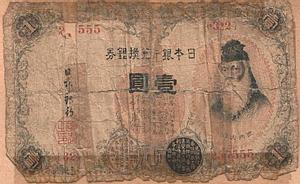
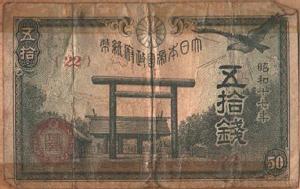
|
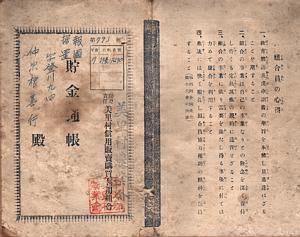
|
Without further incident of any consequence we arrived at Ulithi. Another little Coral Atoll just sticking a few feet above the surface of the sea. Here again was the now familiar little circle of Coral enclosing another beautiful harbor. The harbor was just overflowing with hundreds of ships. We only stayed here overnight and early the next morning we started out of the harbor with about 18 other ships. This time we got into regular convoy formation, 3 ships abreast and six ships in length. We had six Navy ships acting as convoy, among these: one PC, one SC, an LCI, the other three ships being destroyer escorts. It was quite a convoy and made a beautiful sight. As usual we were in the tail end, being the port ship of the last three. By now we knew our destination definitely, OKINAWA. We had been following the news flashes about the heavy fighting going on there.
We sailed for days without incident and one night I was awakened by my Chief, who told me to come on deck and see the fireworks. So topside we hurried and off on the horizon ahead and to the starboard the sky was filled with star shells, rockets and etc. The tip of Okinawa was getting close by and the navy was standing by off shore and shelling a little island that covered the approaches to the main island. We watched the show for quite some time and it was an awe inspiring spectacle. It made us wonder what was ahead of us. The next morning our convoy was split up as we approached Okinawa. Part of the ships were to go to the west coast of the island, where the Marines had made their initial landings. The other part, some eight ships, of which our ship was one, was to go up the east coast and participate in a new landing in what was later named Buckner Bay, at Yonabaru. So on we went and about noon started to change formation and get into single file for our entry into the bay.
As we steamed into the harbor what a sight and a thrill. On our port was a line of battlewagons, cruisers and destroyers, steadily throwing shells into the interior of the island. An intermittent yet incessant roar from this quarter kept you very much alive to the War. On our starboard was the island itself, very green in varying shades and very peaceful looking. Through the binoculars it looked for all the world like the little cameos and prints that we had been taught to know as Japan. The terrain was rough and hilly, one range of hills after another. And practically every spot visible on the hills seemingly under cultivation. Winding down the hills, the little trails known to the natives as reads. Taking off of these roads, hundreds of little footpaths leading off to the little cultivated patches. The hillsides were drained by little hand dug ditches running in all directions around the little individual plots and the dirt from these ditches was used for little elevated footpaths leading into the hills. No fences or barricades, just thousands of little cultivated patches, 50 feet by 100 feet or less, planted in all kinds of vegetables with all shades of green resulting. The hillside resembled a huge patchwork quilt. The natives, in their distinctive garb, were easily picked out in the fields and along the shore. Even the shore line was quaint and picturesque, huge rocks sticking up like mushrooms, the water having cut away the middle portion so that they resembled huge toad-stools. The rough stone beaches contrasting sharply with the neat hand placed stone sea walls built as protective barriers by the natives.
We first anchored at a point near what was known as Gray Beach, but nearly got stuck in the mud so changed our anchorage to a point just off Brown Beach, which was the line of combat between the Americans and Japs. Just south of Brown Beach in the Jap held territory was the city of Yonabaru, which was the focal point of an intense bombardment by some of the warships lying off shore. Two troopships were anchored close by us and filled with Marines whose objective was this town. The water around these ships was filled with the little personnel boats and other small landing craft, all busily moving around like little water bugs. One other freighter was anchored nearby, busily unloading materials and supplies for Brown Beach.
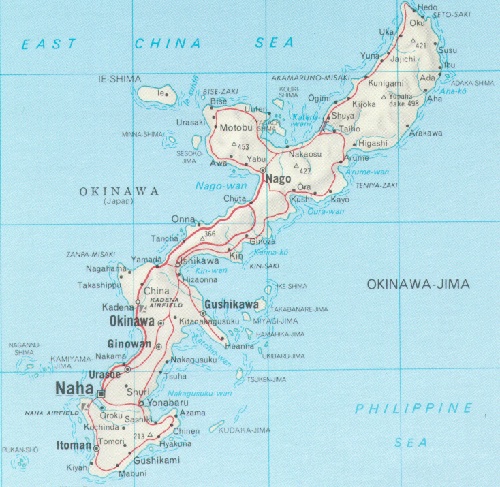 |
Without warning a Jap Plane came into view and dove straight at our ship. A few bursts from his guns and you could hear the rattle, like hail on a tin roof, as the bullets bounced around on the metal decks. Down, down it came as our gunners jumped to their guns and gave it all they had. At about 500 feet the Plane banked and passed directly over our heads. Then we noticed two splashes in the water off to our starboard. Just splashes, no explosion. Then we suddenly realized why as two white streaks were suddenly forming in the water and quickly coming our way. We all froze in our tracks and grasped the railing, expecting the explosion to shake us up. But the streaks just missed the stern of our ship by a pitiful narrow margin and suddenly ended up directly amid-ships of the freighter on our port with a terrific blast. Two gaping holes appeared at the ships water line and you could hear the water as it gurgled in through the holes. But an APC lying nearby immediately pulled up anchor and worked her way alongside the stricken ship, and the two ships were securely lashed together. This prevented the freighter from sinking and she was quickly unloaded, by dumping oil drums overboard until the holes were above the water line. Luckily the ships refrigerators were on the side struck and prevented the water from flooding her too quickly. Otherwise she would have filled and foundered in a few moments.
But before all these details took place, another dive bomber came in and dropped his bombs close by our ships. In banking, on coming out of his dive, the Zero slid within range of one of our Cruisers, busily engaged in shelling along the shore. There was one terrific blast from the Cruiser, as she let go with all her anti-aircraft guns, and the Zero just disintegrated in mid air, burning bits of plane dropping in to the sea in a wide area.
This was our first experience in direct attack from the air and you can just bet our hearts were in our throats quite a bit of the time. After the attack our gunners were naturally quite jittery and nervous, but luckily no one was seriously injured. Soon after this attack, the Port Director ordered our ship to change anchorage again, for safety reasons.
But before we left this spot we saw the Marines make their landing along the beach at Yonabaru.And that was a sight to see. First of all the Cruisers and Destroyers shelled the beach unmercifully. Then our dive bombers came in and did their bit of strafing and bombing the area. Two LCT's, equipped with rockets rode in off shore and literally plowed the beach up with rockets. Before the smoke had lifted from this last rocket barrage, the little personnel boats and tank lighters were on their way in and the Marines were rushing the beach. Tanks and flame throwers followed and the battle was on. The warships changed the direction of their shells and the little band of Marines had taken over. It was a thrilling sight and very interesting, but deep down inside of me was a hollow feeling as I realized what those boys were going into. The sight so fascinated me that for a long while after dark I followed their progress as they passed through the town and reached the hills. The terrible flame throwers were constantly in action as the hills were honeycombed with caves and it was necessary to burn the enemy out. All night long these flame throwers would light up the sky with a bright weird flash. The ships kept star shells going all through the night so the boys would not get lost in the darkness. Steadily all day long and all through the night whether rainy or clear, the battle rolled on. The deep throaty rumble of the big ships guns, the steady but varying crackle of the smaller arms ashore. The heavy terrific jolts as a big air bomb hit its mark. For some ten days steadily this roar of battle constantly rumbled in our ears. Sometimes the detonations from ashore were so great that even our ship shook from them even though we were anchored some two miles away. God, what a Hell it must have been ashore. Shells coming in from all directions. Bombs and rockets from overhead. Everything around you exploding and crumbling before your very eyes. And still you had to burn the Japs out of the ground. I saw this area later, before it had been cleared up, Naha and Shuri and etc., and it was awful to behold. Naha, a city of some 70,000 people with paved streets street cars and etc., nothing but a flat stretch of rubble and desolation. Not a tree or a blade of grass left. The accuracy of the Navy's gunners was uncanny. Hardly a shell had hit the main paved streets though the houses on either side and everything else was absolutely annihilated. One big Shrine and School intact with only an odd shell hole, while surrounding it, utter desolation. The loss of life from the enemy standpoint must have been appalling. The dead and the mangled, and the rats and stench resulting became a serious problem. An army unit of new troops was sent in to clean up, and had to be withdrawn, An old seasoned Marine unit was sent in to clear away the dead, and they did a marvelous job. These clean up units, of all the Services, surely deserve a lot more credit than they get. It is almost unbelievable how thoroughly they do clean up. It was unusual to ever run across an old corpse anywhere after they had finished their job.
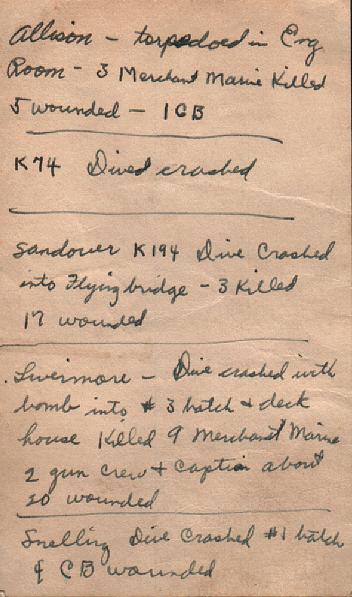 One of the original casualty lists as taken down by gunnery officer from their portable radio sets. |
But all the battle was not ashore, as we were soon to find out. After our first air attack we moved to another part of the bay, in amongst the ships in the harbor. The idea seemed to be that a single ship was a so called "Dead Duck", our only safety lay in gathering together as closely as possible so that our combined fire power would be effective. And it wasn't long before we had a chance to test this theory. All the freighters were gathered together,and all available Navy Ships were ordered to anchor around us. Net Tenders, Mine Sweeps, PC's, LCI's and LSTís. all would anchor in a compact group. In the evening just before dark, which was considered the most vulnerable time for attack by air due to good visibility, the harbor would be screened by a smoke screen. The freighters would light up their smoke generators and a few LCIís with generators would roam around with the generators in operation. It was wonderful to see how effectively the harbor could be screened in this manner. But next morning the fun began and the next five days will ever live in our memories.
The Alert went off about 8:30 the next morning and almost immediately it seemed the roar of the guns was terrific. A large group of "Kamikaze" or suicide planes had come in and a terrific 20 minutes started things off; one plane, a two motored job, dove directly at us and our forward three inch gun was spitting shells as fast as it could. When it seemed almost too late one of our shells sheared off part of a wing, causing the plane to swerve to one side, just missing our rigging by inches, and it plowed in to the superstructure of a troop ship on our starboard side. The ship burst into flames immediately after a terrific explosion. There were over 2000 marines aboard at the time. But this was only the beginning. With a crash another plane dove into the open hatch of the ship on our port side. Then the ship on our stern took an aerial bomb and a plane dove into its side. A little PC who was zigzagging and shooting as fast as it could, came into view and took a large aerial bomb on its deck, almost bending it in two. A tug near by hurried over and tied to the little PC and kept it from sinking. Another plane dove into the water on our port side, the resultant explosion making the ship shudder and splashing us with shrapnel and water, but strange to say did us no damage. Another plane dove for a Net Tender near by and just missed it by inches, the explosion drenching the ship. A freighter near by took another plane in an open hatch. This ship had almost finished unloading and the explosion that followed just about cleaned out the interior of the ship. A few 16" by 16" timbers in the lower hold was all that prevented the plane from going clear through the hull and sinking her immediately. As it was, she was about a total loss.
Almost as quickly as it started it was all over and we could observe the results. How we ever came through was a miracle. The ships on either side of us and on our stern, burning and crippled. The PC being held up by the Tug, but in the end a total loss. An LCI out of commission and being abandoned. One Net Tender badly damaged and a Mine Sweep badly damaged, also another Liberty Ship a total loss. I later got the official announcement of the casualties from the Navy with the Gunnery Officer over our ships radio. He gave me the original notes as a souvenir. Time elapsed TWENTY MINUTES. We only had a few casualties on board our ship and these not very serious. Our ship alone had fired over 2000 rounds of 20 MM shells and 50 rounds of 3" shells. Our group of ships had shot down six planes, our ship getting credit for one, that first two motored job.
From then on for some five days these Kamikaze attacks persisted and more than once it just seemed a miracle that our ship had come through. But it never seemed so bad as that first big twenty minutes. Other ships were lost and there were many casualties, but in the end the enemy accomplished nothing, for still the supplies and materials were piling up on the shore at a tremendous rate. The building of roads to get these supplies inland where they were needed was our first big problem. Rain was almost continuous during those first weeks and the mud became a terrific problem and really fouled things up.
After we had gone through the five days of incessant air attacks, it can well be imagined that the gun crews were pretty well fagged out. I relieved the gunnery Officer at his request, occasionally, so that he could snatch a few hours of much needed sleep. The civilian crews that we had aboard were actually a nuisance for they mostly went in hiding and were never available for their duties as ammunition passers for the gun crews. After that first big twenty minutes, I organized crews for this work from among the CBís unloading the ship and put my Chief in charge. These boys came through in a big way and won the respect and admiration of the Gunnery Officer.
On the last day of the attacks, our Captain went ashore and proceeded to get himself regally drunk. He brought another officer aboard with him on his return to the ship. That night with no alerts, most of the gun crews were glad to turn in and get some much needed rest. About 2230 hours that night I was awakened by a commotion on board and the sound of a shot rang out. I slipped on my clothes and just as I stepped into the companion way, I met the Gunnery Officer, who also had been awakened and had turned in an alarm. It seemed that the Captain had gotten into a fight with the Lieutenant that he had aboard as a guest. They were both dead drunk and an argument ended up in a regular drunken brawl. The First Mate finally succeeded in getting the Lieutenant into a small boat headed for shore and the Captain to his quarters where he passed out. But somehow the crew had managed to get some liquor aboard, or more probably stolen it from the Captain while he was drunk. They all proceeded to get drunk and soon fighting started. The Cook wielding a big butcher knife started out after the Chief Engineer, who also was drunk, and cornered him in his cabin. The Chief Engineer pulls out a pistol and started shooting at the Cook. Luckily no one was hurt, but that started a general melee and fighting and cursing broke out all over the ship among the ship's crew. The Gunnery Officer immediately took over the ship, and routed out all of his boys to round up the ship's crew. Boy what a night. It was almost daylight before order had been established again. The Captain, still in a drunken stupor, started mussing up things again next morning, fussing and bawling everyone but and especially lashing out at the poor Gunnery Officer. But the Gunnery Officer threatened to call the Port Director and request a Patrol for the ship unless the Captain got in his cabin and stayed there. He sulked for most of the morning, but did not openly defy the Gunnery Officer. By noon the First Mate succeeded in getting the Captain in bed again and left him sleeping off his drunk. Some two days later, as the ship was just about unloaded, I received orders from my C.O. to come ashore and report for new duties. And was I glad to get off of that "hell" ship, even at Okinawa.
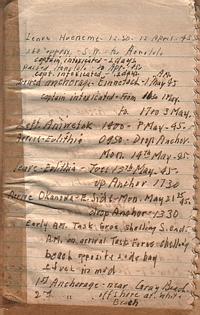
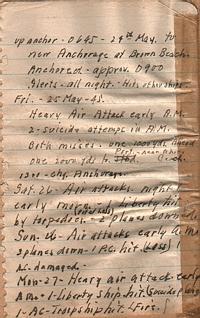
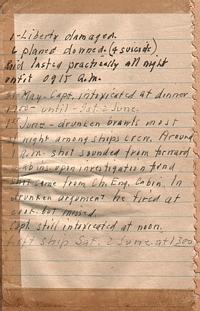
| ||
So I left the ship bag and baggage and then went ashore. Then plowed through incredible mud in a jeep, to what was supposed to be our camp site. Upon reporting to the C.O. I was immediately assigned the job of getting water. Drinking water here was a critical item, as all water was supposedly contaminated, due to the long use of human waste as fertilizer. Thus a complete water plant had to be set up including, treatment, settling, chlorination and filtration. As usual our camp was a regular quagmire. The constant rain just kept things in a mess. The so called roads were a sight to see and the constant traffic and the heavy trucks kept them like "rivers of mud".
Our company office was a tent located on the main road
point at the entrance to our camp area. From this, in one direction
we had a good view looking out over a little valley. The road
that passed our tent was visible in one or two places out in
the valley as it wound itís way up and around the hills. Soon
after coming to camp while busy at the company office I was
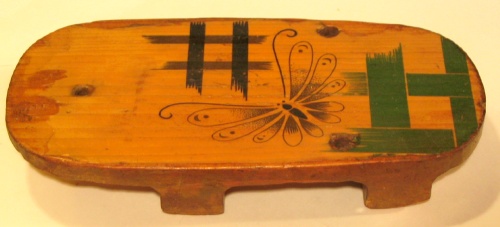 treated to one of the most pitiful sights that mortal man has
created, and one that will live in my mind until my dying day.
A long line of native people, mostly women and children, plodding
their weary way to the civilian centers allotted to them.
All the women had baskets on their heads, filled with food
or bundles of straw or pieces of wood or anything that would
help to provide food or shelter. Not just a few hundred folks,
but thousands. A veritable flood of the most miserable of humanity
slipping and sloshing through the foot deep red mud. Long after
the first ones had passed, you could look out over the hills and
see them as they followed the road miles away, though they were
still passing our tent. I timed that first pitiful stream of
humanity and they were over FOUR HOURS in passing our tent.
Ragged and dirty, barefooted, with a hopeless fear in their faces.
But no disorder or shouting. Over half of the women pregnant and
large with child and half of these with babies hanging from
their backs, as well as the load on their heads. Never a complaint,
no bickering, no fussing. No children crying, seldom even
a cry from the tiny infants. Just terrible Calm and Patience.
Many times we were to see these pitiful parades, but it never
failed to seem to upset me inside and make me want to cry out
against Manís inhumanity to Man.
treated to one of the most pitiful sights that mortal man has
created, and one that will live in my mind until my dying day.
A long line of native people, mostly women and children, plodding
their weary way to the civilian centers allotted to them.
All the women had baskets on their heads, filled with food
or bundles of straw or pieces of wood or anything that would
help to provide food or shelter. Not just a few hundred folks,
but thousands. A veritable flood of the most miserable of humanity
slipping and sloshing through the foot deep red mud. Long after
the first ones had passed, you could look out over the hills and
see them as they followed the road miles away, though they were
still passing our tent. I timed that first pitiful stream of
humanity and they were over FOUR HOURS in passing our tent.
Ragged and dirty, barefooted, with a hopeless fear in their faces.
But no disorder or shouting. Over half of the women pregnant and
large with child and half of these with babies hanging from
their backs, as well as the load on their heads. Never a complaint,
no bickering, no fussing. No children crying, seldom even
a cry from the tiny infants. Just terrible Calm and Patience.
Many times we were to see these pitiful parades, but it never
failed to seem to upset me inside and make me want to cry out
against Manís inhumanity to Man.
It was quite a problem getting up the tents and finding some way of making dry quarters for the men. But rain or no rain the work and camp construction went right on. For a while we Officers crowded together in whatever space we could find in the mud. But after a few days an old Jap dwelling was located in our Officer's Country and by crowding we could all get under cover. And at least it did have a floor in it of sorts, which was a big help. And it also had rats in it, which were not such a big help. These varmints were very much in evidence everywhere. Apparently they just lived and thrived along with the people. Even the finer homes were full of their trademarks in all the unused places. After some three weeks of continuous rain it suddenly cleared up and stayed clear for some ten days. This was a real break and you can just bet that by the time that ten days was up we were mostly out of the mud at least.
Road work was put on a 24 hour basis, 3 shifts of 8 hours each and with the marvelous equipment we had it was uncanny how the place grew. There was no gravel or stone in our locality, but some of the hills were formed by Coral deposits. So Coral pits were opened and this material was used for road building. A good roadway was built from the camp to the beach, some four miles or so, and another across the island linking up the two invasion beaches. Soon air fields were opening up like magic. At first this was not as simple as it sounds, for every working crew and every truck had to have their armed guard. Often, especially at night the trucks would be fired upon by some hidden Japs. We had air raids too, but our defenses were so good that they did not bother us too much. For us oldsters who had been on Guadalcanal and etc. these raids were just real good shows, especially at night. Hundreds of searchlights would converge on the planes and pick them up and then the Anti-Aircraft Gunners would do their stuff. Many times these planes would come plummeting down in flames, the lights staying with it until they were sure it was no fake. Of course the Japs would get in a lick too, and once a huge ammunition dump was struck by a bomb and went up and oh boy what a time we all had for some 24 hours. Luckily for many of us the terrain was ideally suited for ammo storage due to the numerous hills and ridges. A long ridge was the only thing between this ammo dump and our camp and it prevented many a casualty.
Camp Life
We soon had a real camp under way. At first it had to be guarded unusually well, as groups of Japs were attempting to break out of the trap south of us and make their way to the big mountains in the north and safety. At first the Marines made a tremendous effort to round up these marauding groups, but as the CB Units got established and became so numerous, they just set up headquarters and told us to set double guards and shoot to kill and report any unusual activity. When notified they would send out a detail to investigate. The chatter of the carbines could be heard all through the night and it was not unusual to get two or three Japs a night for a while.
Besides Japs, they also got many a roaming pig and a chicken or two. You never investigated a noise. Just sprayed the area with lead and in the morning went out to see what you had bagged. Some very amusing as well as tragic incidents came out of this practice.
A little fat, half grown pig had roamed into our Officers Quarters and nosed around our gear and cots and made quite a mess of things. Some of our mess boys caught Mr. Pig and the Cook confined him. He became quite tame and was dubbed "Tojo". The cook was looking forward to the day when he could get permission to barbecue Tojo. But as luck would have it, one night he strayed a bit. The guards, who all had the trigger itch, emptied two carbines. Next morning we went out to see what had excited the guard and Lo, there lay Tojo; a regular sieve. He had surely picked up weight in a jiffy, but not the kind that makes for good barbecue.
At one time the main hill overlooking our camp became so infested and dangerous that the Marines together with our M.A. got up a party and made a daylight foray to a group of caves on the side of the hill overlooking our camp. This trip they ran into some real excitement. The Japs hid in the caves and had to be smoked or burnt out. They came back with about a dozen prisoners, among them some women, and left quite a few out in the hills who would never come out.
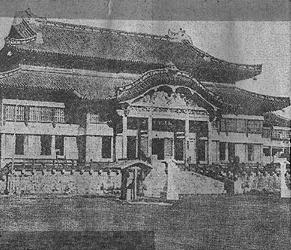 One of the main temples on Okinawa was the Temple of Shuri, known at Shuri Castle. This is typical architecture. |
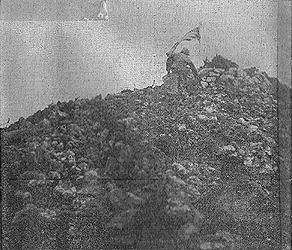 ...the Castle after Shuri fell. Typical of the absolute devastation of modern war. |
Ancestral Tombs
The Island of Okinawa is covered with Ancestral Tombs. These take the place of the cemeteries of the Western World and were most interesting to us. Each family group has a huge vault built into the side of one of the hills. Some of these were elaborate concrete structures. Only one opening, about 3 feet high and two feet wide, to each Tomb, and inside on a raised platform repose the bones of the deceased ancestor, all nicely tucked into a beautiful hand made glazed porcelain vase. Some of these tombs were really ancient, there being as many as 75 of these beautiful urns in them. The preparation of the bodies for these urns is a very unusual process. A rough wooden box is prepared without a cover, but with four rough and spindley legs. The body is placed in the box and little dishes placed under each leg. These dishes are filled and kept filled with scented water to keep out the ants and such. The body, apparently treated with spices and left bare, is then allowed to stand and disintegrate for a period of from six to eight months. Then the flesh is removed and scattered over the earth. The bones, sometimes polished, are then neatly arranged in an Urn, and placed on the platform. These decaying bodies were often encountered in the tombs, but strange as it may seem, the smell never seemed to equal the gruesome sight. These Ancestors are supposedly the active guiding spirits in the community and country.
Work Projects
After completing my project at our camp I was assigned as Officer in Charge of Water Projects on the outside. My first project was a Galley and water system for the Joint Communication Center, for operation of B-29's. Before completion of this project we had another good big job assigned to us. Galley showers for men and Officers, water system and drainage for a big Mine Depot in process of construction. Here a survey had to be made to locate a source of water. Finally located water in a beautiful little stream some three quarters of a mile from the camp site. Here we installed a small pumping plant and ran a main to the purification plant located at the camp site. This purification plant with its storage and settling tanks, pumps and filter made quite a neat little job in itself and upon completion it operated so nicely that we received quite a nice commendation from the C.O. of the Depot Unit.
By summer the island was jammed full of equipment and materials and men, including C.B. Units, Airborne Units, and etc. We were all set for an invasion of Japan and it was really appalling the great quantity of materials that were gathered there. And planes, thousands and thousands of them of all types. The C.B. units were working like mad on roads, air fields, ammunition dumps and extending storage areas. The Marine units were busy practicing beach head maneuvers and the Airborne Units were kept on the alert with their practice maneuvers. Excitement and anticipation were the order of the day and all hands were just awaiting "The Word".
One night, about and hour or so after dark, when most of us Officers were just about ready to turn in, the rumble of Anti-Aircraft fire broke the stillness. A surprise air attack, we all thought and began to converge on the Officer's Lounge to get the dope. Tracers were literally filling the air and faint shouts and occasional rifle fire was heard. Then the rifle firing became general and bullets began whistling by in all directions. Then the solution to the puzzling situation was found. PEACE had been rumored over the radio. The Japs had asked for it and the boys were out to celebrate, our C.O. began to get worried about so many rifles being carelessly fired and when we heard the whine of a bullet and a couple of them hit our Quonset Hut Mess hall, he really got excited. So about 10 P.M. all the Officers were ordered to report to Headquarters and over the speaker all hands were ordered to report to the parade ground. We Officers then had to collect all rifles and ammunition and check them in. Ordinarily this is quite a job in itself, but on a dark night with the whole camp in an uproar, it became a really difficult task. It was about 2 A.M. before the job was completed and we could get back to our quarters to catch a little sleep, before morning "Chow Call".
The next morning the news of the peace was confirmed.
Yes "Peace" was becoming a reality and the invasion plans were all canceled. But nothing could shut off the tremendous supply of materials on its way out to the area, in a string of ships running into the thousands and stretching all the way back to the coast of California. And this material began piling up on Okinawa, which was already filled up with the usual great quantities of excess needed and ready for the invasion proper. New storage areas had to be opened up quickly, and the materials and equipment came in so fast it was like an avalanche, and one wondered whether or not the island might not sink under itís weight.
A little later we all got a thrill as the Jap planes passed over on their way to the little island off Okinawa where the passengers were transferred to American planes for their trip to the Philippines and the first phase of the Peace negotiations. Then after MacArthur had been flown to Japan and the great signing was taking place aboard the Battleship Missouri, his first occupation forces started leaving Okinawa by air. My what a sight that was. For three days and nights without interruption, a big four motored transport would take off the neighboring air field every three minutes on the dot. You could check your watch by them they left so regularly, and the same thing was happening on two other air fields in the vicinity. Each one loaded with troops and equipment and headed for Tokyo. And how our hearts did thrill at the prospect of Peace again. Soon the talk of discharges became all the rage. Then the order to release all enlisted personnel over 40 years of age. We had quite a number in this category and these first groups to leave got a big hand and built up in us a hope that it wouldn't be long now. Then the point system came out. In August I became eligible for discharge along with two other Officers, namely our C.O. and our Executive Officer. Naturally it would not be logical, to release the C.O. and Exec. at the same time, so the Island Command ordered the C.O. to remain. The C.O. took the order very hard and seemed to resent the fact that we were not detained also, so he did all that he could to prevent us from going.
He did succeed in delaying us for a few weeks, but about the middle of September, Lt. Comm.Stewart ( the Exec.) succeeded in getting our orders through and the C.O. was forced to release us. So we packed our gear and moved to the transient Officers area at N.O.B. to await our transportation. The delay by our C.O. caused us to miss our regular scheduled transportation, but nothing mattered now for we were on our way out. About this time Admiral Halseyís third fleet was converging on Okinawa and we were advised that we might possibly get out with them. You can just bet that we diligently watched as the big ships came into harbor and anchored off shore. We had many a good time speculating as to which ship we would most likely get on. Then shortly after this we noticed the big ships disappearing out of the harbor and about 10 A.M. a Typhoon warning came over the speakers. All hands were ordered to their tents to see that all tent stakes were driven firm and all gear lashed down. Winds of 65 Knots were predicted by dark. Before noon it had begun to rain and the wind was rising. By mid afternoon the storm was really getting under way, and the rain was falling in sheets. By 5 P.M. another warning was broadcast, and all hands were ordered to recheck tents and gear and to stay clear of the center pole of the tents as the wind would increase some 55 knots. Oh boy, figure that one out - 65 knots plus 55 knots equals 120 knots or 135 MILES PER HOUR. Now folks that is some breeze. Soon things were really happening. All lights had long since gone out. The speaker system went next. The din of the storm was awful and the old tent was under a terrific strain.It seemed impossible for it to stay put. But we had done all that we could and so had to crouch there in the dark and await whatever was to come next. One of the two by four pieces of lumber used as framing on the windward side of the tent was bent and soon snapped like a match stick. When that happened we all expected the tent to take off but somehow it stayed put. We put some of the heavy chests on that side to help brace things. Every now and then we could hear shouts and crashes above the storms roar as some tent would give way or some debris go sailing by. About 11 P.M. I Just decided to lie down and let the darn thing go if it would, for we could do nothing more. I must have fallen asleep, for I was awakened by a terrific din. It was about 2 A.M. and the storm was at it's height. What a racket. It was almost impossible to make ourselves heard above the din of the storm. But our tent was still holding though badly battered.
About 5 A.M. the storm started easing off, and around 6 A.M the rain ceased. A little later we dared to open up our tent and take a look outside. And what a sight greeted our eyes. Debris everywhere and surprisingly enough over half the tents were still up, though in every conceivable angle, and some almost in tatters. The movie area, including screen and long benches used for seats and also boxes used to sit on, was swept clean. The only visible thing left was the stubs of the uprights that had been used to hold up the screen. Sea chests and bags, pots and pans and etc. were scattered everywhere. In back of our tent,on the side of quite a steep hill, was the "Head", an 8 holer with a nice screened in house around it. Alas, as we gazed at where it should have been, we were surprised to see one lonely individual sitting nonchalantly out in the open. The building was completely gone, only the heavy frame with the eight holes came through the storm. And strange enough it was still in place. The roofs of all the buildings in the area were gone including the big mess hall. All the cooking paraphernalia, tables, chairs and loose cases of food were scattered over a wide area. Even the quonset huts had the tropical raised portion of their roof a ripped away, just as though a giant finger had deliberately ripped them off. One almost unbelievable thing gave me a big shock. A large stack of lumber had been built up just to one side of our camp area. It belonged to the C.B. Unit who maintained the camp. This stack of lumber was some 40 feet in length, and had been carefully stacked with cranes on big 14 inch by 14 Inch timbers so that it was some twelve feet or more in height. Believe it or not, THE ENTIRE STACK OF LUMBER WAS GONE. Only the big timbers that it had been stacked on remained. And stranger yet was the fact that the area was not especially littered with this sort of debris. Where did it go? The China Sea must have had a sudden rain of lumber at some place. How more people were not killed is another mystery.
The near by Army Air field came through in unusually good shape. The planes had all been securely lashed down. One big transport plane was found to have a "Piper Cub" stuck right through it, the tail of the Cub sticking straight up in the air. Where the little Cub came from, no one seemed to know, for the nearest Cub field was some four miles away, against the wind. The destruction along the beach was terrific. Two Liberty ships with full steam ahead, had not quite cleared the harbor entrance, when the wind became so strong that it forced them backwards some three miles and piled them up on the beach. LST's and LCI's and dozens of smaller craft were piled up on the beaches and reefs. On Buckner Bay just a few miles from us, was located a full squadron of PBM's, the big four motored patrol planes of the Navy. There were 30 planes in this squadron. Two were on patrol so missed the storm. But the order to evacuate the area was given too late and only one plane succeeded in getting off. The balance were totally wrecked. Twenty seven big four motored amphibians lost in no time. Worse than any battle loss during the war.
Homeward Bound
Some two days after the storm we were advised that part of the Third Fleet was lying off shore outside of the harbor. We were ordered to proceed to the pier for transportation out to the Battleship Nevada. So on the 13th of September Comm. Stewart and myself made our way with bag and baggage, to the Brown Beach pier and boarded an LCI which transported us some three miles off shore to the Nevada along with some 350 enlisted men. We were cordially greeted on board and as it had rained on the way out and most of us were wet, we were taken in and given hot coffee and buns.
A battleship is quite a busy city in itself. Although the ship was pretty crowded, there being some thousand passengers besides a wartime crew, we were comfortably quartered. Most of us Officers were considered as guest passengers and had no duties assigned to us. Comm. Stewart and I came in this group, and our trip aboard the Nevada was surely a delightful experience. The organization aboard a Battleship is marvelous. Every one had their place and duties, and the smoothness and efficiency and ease of operation was something to behold. The Task Force of which we were a part consisted of the Battleships Texas, Arkansas, West Virginia, Wisconsin, Nevada, Colorado and Iowa; three light cruisers,and a half dozen destroyers. We set a course straight out to sea in a direct line to Pearl Harbor, Hawaii. We did not attempt to make time, as everything went strictly according to schedule. Our schedule called for entering Pearl Harbor on the morning of October 1st and exactly on schedule we arrived there.
The Task Force did quite a bit of maneuvering and had a number of gun practices on the way, and it was a grand sight to see these big behemoths maneuvering around into all kinds of positions and formations. And the accuracy of the big gun crews during gun practice was uncanny. Star shells were sent into the air some two to three miles distant and used as targets. And more than once I saw 5 inch and 6 inch guns make direct hits on these shining balls, extinguishing them almost before they would get to burning good. The launching of air craft from the ship was another interesting sight. These planes would take off and disappear in the distance and then come in on the Task Force for radar practice. All guns over 3 inch on the ship had Radar Control on them and it was an uncanny sight to see all these big guns suddenly swing into position and pick up the planes even before the watch could pick them up.
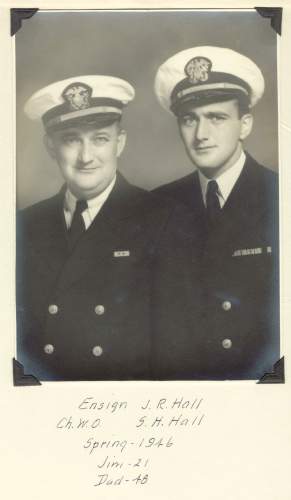 We sailed into Pearl Harbor right on schedule and had lots
of liberty while there. We were not scheduled to leave before
5th October, so I had time to get a good view of the people
and life as it is lived there. Also while here Comm. Stewart and
I were transferred to the cruiser Vicksburg. One Saturday evening
while we were waiting for "chow" in the Warrant Officer's
Lounge aboard the Vicksburg, who should suddenly appear but Jim.
My, was I surprised and pleased. After introductions all around
an extra plate was put on and he had dinner with us. After dinner
we went up on the deck and had a long and happy "gab fest". We
had so much to talk about that it was eleven oíclock before we
knew it and Jim just made the last boat for shore. We made plans
to meet the next day ashore.
We sailed into Pearl Harbor right on schedule and had lots
of liberty while there. We were not scheduled to leave before
5th October, so I had time to get a good view of the people
and life as it is lived there. Also while here Comm. Stewart and
I were transferred to the cruiser Vicksburg. One Saturday evening
while we were waiting for "chow" in the Warrant Officer's
Lounge aboard the Vicksburg, who should suddenly appear but Jim.
My, was I surprised and pleased. After introductions all around
an extra plate was put on and he had dinner with us. After dinner
we went up on the deck and had a long and happy "gab fest". We
had so much to talk about that it was eleven oíclock before we
knew it and Jim just made the last boat for shore. We made plans
to meet the next day ashore.
The next day being Sunday, Jim took me to the First Methodist Church in Honolulu. This was my first time at Church Services since peace had been declared. Furthermore it was World Communion Day so we had communion together. So you can imagine what a happy time it was for me. This was my first visit to Hawaii, but Jim had been here quite often and so he proceeded to show me around. After Church and after looking over the best parts of Honolulu we took the bus and went to Waikiki, where we had a nice dinner at a cute little place that Jim knew about. It was a very quaint little restaurant and the food was excellent and served by some mighty cute and pretty Oriental girls. After dinner we roamed on out to the beach and the big American hotels there. Of course all the hotels had been taken over by the services, but the beach and itís setting was really beautiful, though not nearly so large or elaborate as I had expected. Then we walked on through the town which also was a beautiful place. Then to the Public Park and we arrived here just in time to listen to a concert played by the "Royal Hawaiian Band". It was a grand program and I could see that Jim was really enjoying himself. I was surely pleased that he still had a yearning for really good music. After this we came back to the harbor and I took Jim to our Warrant Officer's Club, where we had a swell steak dinner. The Warrant Officer's really have the finest Club on the Base. Far better than even the Senior Officer's Club.
They have nice looking girls to wait on the tables, a big dance floor and good music. Not a Juke box, but either an orchestra or a trio. It is really a grand place and we had a good dinner and met lots of people, especially the Warrants from the Nevada and Vicksburg. I had to check in aboard ship and so left Jim at the bus. The next day I visited Jim at his barracks at the Officer's Replacement Center. So we started out from there and visited Honolulu and looked over the Base. We were scheduled to leave early the next morning and so I had to be back aboard the Vicksburg quite early. So after another nice feed at the Club, I again left Jim at the bus and made my way back to the ship. My stay here had been short, but most happy and will live in my memory always.
As per Schedule we hoisted anchor before daylight, and moved outside of the harbor where the homecoming Third Fleet formed in line and paraded past Diamond Head for the Honolulu folks. Navy planes escorted us and twisted and dove and played all around the ships. About a half day out from Diamond Head the Task Force separated into three sections. One group headed for Seattle, another group for Los Angeles, and the third and largest group heading for San Francisco. The Vicksburg led the way for the San Francisco Group. No more maneuvers now and right on schedule we approached San Francisco. Admiral Halsey had it prearranged that we would form outside and parade through the Golden Gate and up the bay to our anchorage. All hands were ordered in to Full dress blues and you can bet that excitement was beginning to run high.
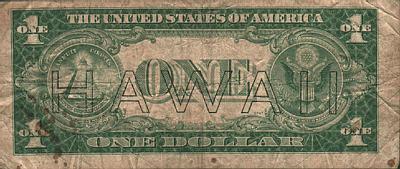
U.S. Hawaiian Currency |
As we moved under the bridge a lump came up into my throat and it was all I could do to keep from crying. More than one on that deck had tears streaming down their faces. As we left the bridge and passed into the Harbor, the ships, factorys and etc. all started their whistles blowing and all along the route the bells and whistles would start as we approached. The noise was really something and old San Francisco was really out-doing herself welcoming home the old Third Fleet. Oh, how good that shore looked to us.
We anchored off shore and by late afternoon we had been transferred to shore, bag and baggage. How good that good old earth felt. There is just nothing like it anywhere else. It was HOME. Yes, back home again and all the familiar scenes and places just filled you to overflowing with gratitude to God for his mercies. And the glorious feeling that this time you were back to stay. America the Beautiful, America the wonderful, Yes "God Bless America". So we come to the end of another chapter in Life's Story. We were soon on our way back across country and on October 24th I passed through the portals of the Charleston Navy yard with my separation papers in my pockets. On December l3th, 1945 I completed my Naval service and became a full fledged civilian.
And so with gratitude in my heart for all the Guidance and protective care and the Hope that helped to bring me through the past few years, I solemnly bow my head in Gratitude and utter a little prayer to God, that should be deep in the hearts of all those who claim to be Americans.
|
Our Father God, to thee, Author of Liberty To thee we pray. Long may our land be bright With Freedom's HOLY LIGHT Protect us by Thy Might Great GOD, OUR KING. Amen. |
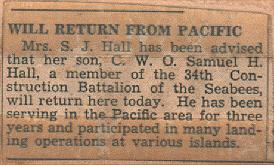
|
NEWSPAPER CLIPPING: Thousands of these orphans were cared for
by the Army on Okinawa. They were so cute that I should have liked
to bring a whole pocketful of them back with me.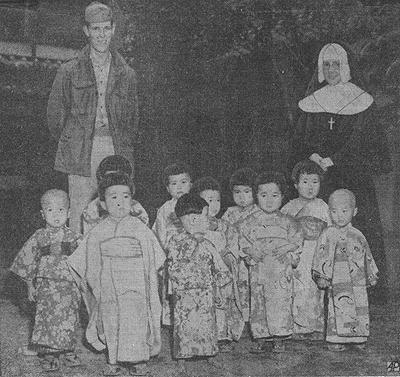 |